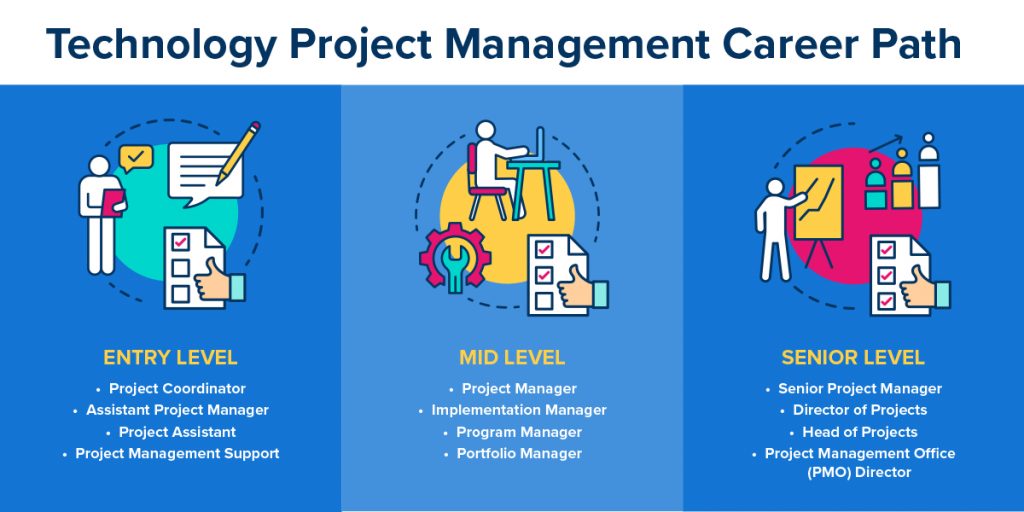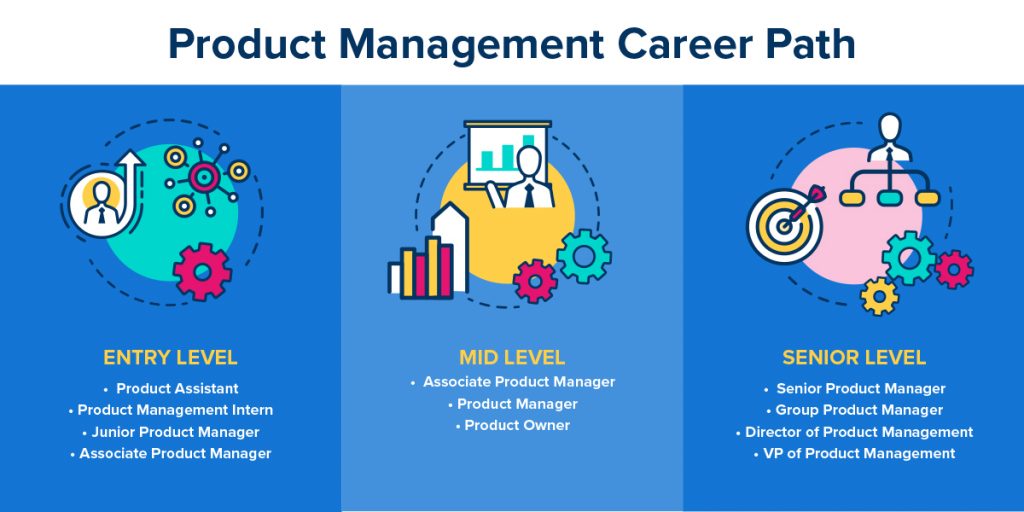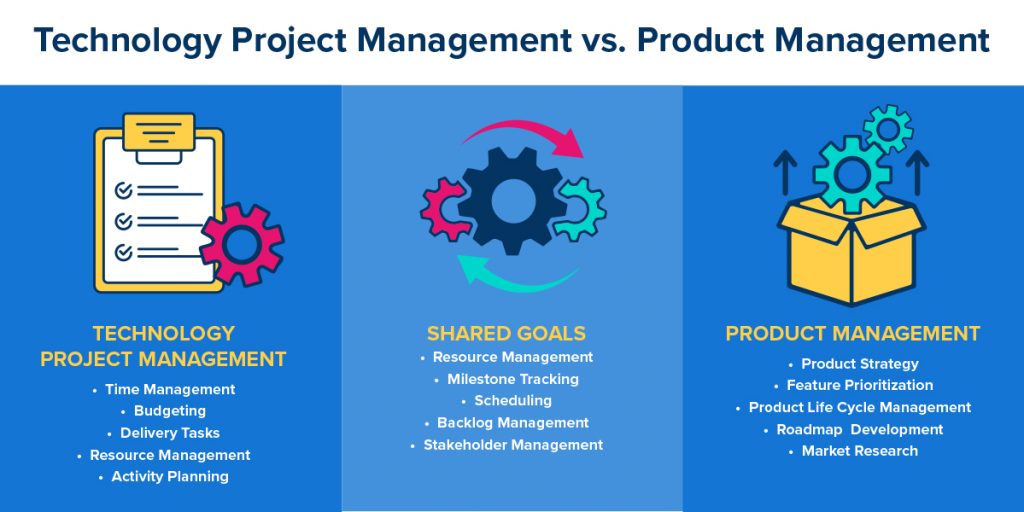Technology Project Management vs. Product Management: What’s the Difference?

Technology project management and product management are familiar terms to many in the tech industry, but how are they different? It’s a common question, and one that you should consider carefully, particularly if you are looking to enter one of these fields. Understanding the distinction can help you determine which field is right for you, while also helping you better understand potential career paths.
To help you get started, we will explore the differences between technology project management and product management, while looking at the various roles in each field. Furthermore, we will discuss the skills related to both fields, and how a boot camp education can help you acquire them.
Technology Project Management
What is Technology Project Management?
Technology has transformed the way organizations work. Today, nearly every project includes a technology component. The management of a project is an essential component of its success, and organizations are beginning to take notice. The need for project talent has accelerated, with employers looking to fill over two million new project-oriented roles each year through 2027, according to a report by Project Management Institute (PMI).
So what does technology project management involve? Let’s start by breaking down what a technology project entails. Projects in the tech sector are often temporary in nature and intended to create something unique, such as a product or service. Projects of this nature are different from routine operations because they focus on achieving a specific goal. In order to be successful, they must be managed to deliver on-time, on-budget results.
Technology project management, then, is the application of expertise, resources, skills and techniques to project activities which result in achieving a specific goal on time and on budget.
Technology Project Management Jobs
Managing technology projects is an increasingly valuable endeavor for companies, and they require highly qualified technology project management professionals to deliver. According to a report from PMI, the need for project managers has grown at a faster rate than that of other professions — through 2027, there will be almost 214,000 job opportunities added each year in the U.S. involving project management.
If you’re interested in a career in this field, here are some tech project management jobs to look out for.
Skills for Technology Project Management
In the field of technology project management, there are a number of skills and qualities that can help set qualified professionals apart from the competition. Below, we have outlined several soft and hard skills that can help you become an in-demand and proficient technology project management professional.
Professional Competencies:
According to a survey by Project Management Institute (PMI), four out of five respondents agree that professional competencies like soft skills are more important today than they were just five years ago. Here’s a look at some of the professional competencies that today’s technology project management professionals should have.
- Communication: According to the PMI, 90% of a project manager’s role focuses on communication-related activities. Communication skills like active listening, written and non-verbal communication and empathy are critical for today’s technology project management professionals.
- Critical Thinking: A fundamental component of any management role, critical thinking will come into play daily in project management, says Forbes. Professionals in technology project management need to be able to make quick decisions while considering the potential implications for the outcome of a project.
- Conflict Management: Bruce Harpham, author of “Project Managers At Work,” reports that 95 percent of employees say they experience conflict with other teams. It is critical for technology project management professionals to be able to address conflict as it occurs. This can help build trust, respect and team collaboration.
Technical Competencies
Now that you have a better grasp of what professional competencies are desired in tech project management, let’s look at some of the technical competencies needed in today’s dynamic, complex business environment. Listed below are some of the core competencies project managers should possess.
- Resource Planning: According to McKinsey, 83% of senior executives say shifting resources are the top lever for supercharging company growth. Technology project management professionals who are proficient in this skill can help drive company growth and make their projects more efficient.
- Agile Methodologies and Scrum Framework: An effective project manager should be able to apply frameworks and methodologies, such as agile and Scrum, throughout the project’s life cycle, according to Indeed. This can help ensure sustainable cycles or sprints, while encouraging frequent output.
- Hybrid Project Management: Forbes recently listed hybrid project management as a core project methodology in which project managers should be skilled. In this model, methodologies such as Agile and others are combined to create a structured, yet flexible workflow.
Product Management
What is Product Management?
According to ProductPlan, product management is defined as “the practice of strategically driving the development, market launch and continual support and improvement of a company’s products.” However, product management is a broad term that can mean different things to different organizations while encompassing a wide range of activities. These activities often include overseeing product development from conception to market launch.
As it relates to technology, project management integrates a product’s user experience, technical specifications and business requirements. Mind the Product co-founder Martin Erikkson describes product management professionals as “the unsung heroes of the tech world.”
Product Management Jobs
Product management’s multidisciplinary responsibilities make it attractive to some of the most ambitious and creative problem solvers across industries. The expertise required to work in product management make these professionals highly sought after.
Based on a study by Neal Iyer, a senior product manager at Proofpoint, the number of product management positions increased by 32 percent in the U.S. from August of 2017 to June of 2019. That is five times the growth rate observed overall in U.S. employment. Today, companies like Glassdoor recognize product management as one of the top five jobs in America, with just under 15,000 job openings.
Here are some of the product management jobs that professionals can access today.
Skills for Product Management
Interpersonal Skills
Product managers must possess excellent interpersonal skills to effectively influence and lead the people they work with, says Indeed. Let’s take a look at some of the interpersonal soft skills a product management professional should possess.
- Empathy: A recent article by UX Collective listed empathy as the most important product manager skill. When product managers understand and acknowledge the feelings of others, and why they feel that way, they can better support their team and improve relations.
- Relationship Management: The ability to manage relationships is one of the most important characteristics of a great product manager, says Harvard Business Review. Resolving conflicts, achieving shared goals and building trust are all essential components of this skill.
- Collaboration: A collaborative attitude is an integral part of a successful product management strategy, according to HubSpot. Product management professionals are often expected to proactively solve problems and improve services by collaborating with other people inside and outside their organization.
Technical Skill Set
In addition to interpersonal skills, today’s product managers also require a diverse technical skill set. Many companies are particularly keen on technical competencies, which is why we have listed a few important ones below.
- Product Backlog Management: In product management, a backlog is a list of tasks that need to be completed before the product is released. According to an article by PivotalTracker, managing this backlog effectively is a skill that every manager should master.
- Data Analysis: Maintaining a data-driven approach to product management can help set you apart from the competition. According to ProductPlan, product managers can use data to identify opportunities or threats in the market, while determining where to focus development efforts.
- Design Thinking: Design thinking is both an ideology and a process, according to EDx. Today’s product managers should seek to understand the user and create a product that people will enjoy. A recent blog by UserGuiding explains why design thinking is a key skill for product managers.
The Difference Between Technology Project Management and Product Management
The terms technology project manager and product manager are often confused, especially in industries that employ both. While product and project management professionals often work together and have overlapping responsibilities, a key distinction is that product managers focus on a product’s life cycle, while project managers steer a specific product through its life cycle, including initiation, planning, budgeting, execution, monitoring and delivery.
We have created the following graphic to help you understand how technology project management and product management differ and where they overlap.
Final Thoughts:
Now that you have a better understanding of both of these fields, you can better decide which path is for you. There is unquestionable potential for future growth in both technology project management and product management, and both can present rewarding career options.
If you’re interested in technology project management, you can learn to effectively manage these projects in many industries with the help of our Technology Project Management Boot Camp. Our curriculum teaches a variety of the skills mentioned in this article, including resource planning, traditional and agile methodologies, scrum framework, hybrid project management and more.
Contact our admissions team at (510) 306-1218 to learn more about the various career possibilities you can pursue in these rewarding fields.
 Live Chat
Live Chat


